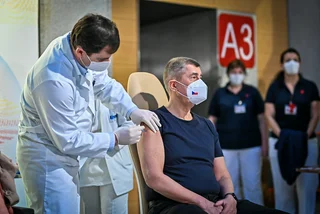A survey conducted by the STEM/MARK agency at the end of July has shown an almost even split in public opinion on whether or not Covid should be treated as an endemic virus like the common flu.
As some countries such as the United Kingdom, Singapore and Austria take more relaxed approaches to the virus following successful vaccination programs, many Czechs remain unsure about moving away from blanket restrictions on life.
48 percent of respondents to the survey were in favor of treating Covid more like the common flu, while 52 percent were against this approach. In a detailed breakdown, 17 percent were definitely in favor of changing the approach, 31 percent were somewhat in support of a change, 32 percent were somewhat against the idea and another 20 percent were strongly against treating Covid like flu.
“The most vulnerable group of people have been vaccinated or have contracted the disease. At this stage, Covid is already approaching something like the seasonal flu. But beware: this isn’t due to a change in the virus, but rather a change in society due to partial vaccination,” commented molecular immunologist Václav Hořejši.
Should the Czech Republic treat Covid like the common flu?
The question of whether or not to start treating Covid like the common flu is assuming greater urgency due to decisions from some countries to take the step. Great Britain’s “Freedom Day” on July 19 saw the removal of Covid restrictions, but the event was marred by rising case numbers. UK government advisors are now predicting that Covid will become a seasonal virus like the flu, which soars annually but does not require lockdowns to keep it under control. To date, increases in hospitalizations following lockdown lifting in the UK have been much lower than experts predicted.
While 30 percent of the British population remains unvaccinated against Covid, in the Czech Republic half of the population are still without inoculation.
Singapore’s coronavirus task force meanwhile recently backed a government decision to lift strict anti-Covid measures, which included the necessity to document every public gathering, strict business closures, and the almost ubiquitous use of face masks. The nation’s authorities say vaccination has proven effective in minimizing rates of infection as well as reducing the severity of the virus.
Such changes in approach come as an increasing number of experts warn that, while Covid can’t be eradicated, it can be managed through inoculation.
“Covid-19 can’t be eradicated, it’s impossible,” said Dr. Peter Juni, a professor of medicine and epidemiology at the University of Toronto. “It’s not like the measles, it’s more like influenza.”
The virus causing smallpox remains the only human virus which the World Health Organisation (WHO) officially recognizes as having been fully eradicated.
It is hoped high vaccine uptake will reduce the threat of Covid to something closer to the flu. John Hopkins University estimates that the mortality rate of Covid in populations without significant levels of shared immunity is substantially higher (possibly 10 times or more) than that of most flu strains.












 Reading time: 2 minutes
Reading time: 2 minutes 



 English
(Proficient)
English
(Proficient)


























